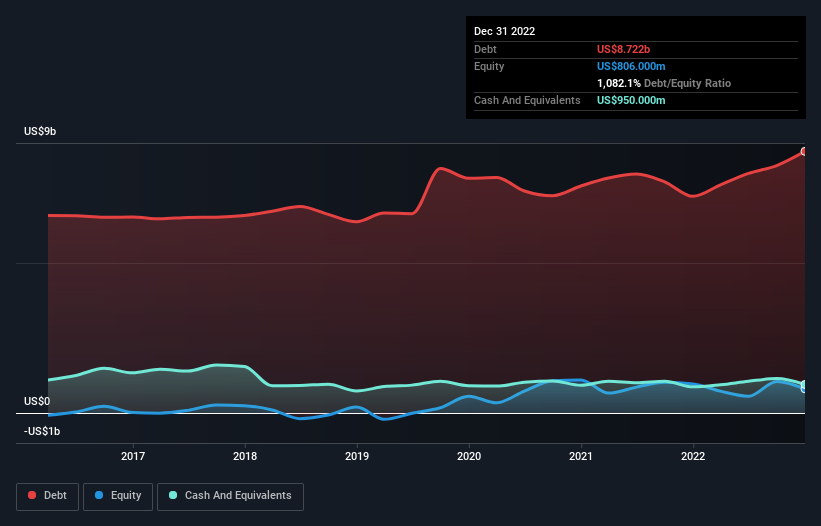- United States
- /
- Household Products
- /
- NYSE:CL
Does Colgate-Palmolive (NYSE:CL) Have A Healthy Balance Sheet?

The external fund manager backed by Berkshire Hathaway's Charlie Munger, Li Lu, makes no bones about it when he says 'The biggest investment risk is not the volatility of prices, but whether you will suffer a permanent loss of capital.' It's only natural to consider a company's balance sheet when you examine how risky it is, since debt is often involved when a business collapses. Importantly, Colgate-Palmolive Company (NYSE:CL) does carry debt. But should shareholders be worried about its use of debt?
What Risk Does Debt Bring?
Debt is a tool to help businesses grow, but if a business is incapable of paying off its lenders, then it exists at their mercy. Ultimately, if the company can't fulfill its legal obligations to repay debt, shareholders could walk away with nothing. While that is not too common, we often do see indebted companies permanently diluting shareholders because lenders force them to raise capital at a distressed price. Of course, the upside of debt is that it often represents cheap capital, especially when it replaces dilution in a company with the ability to reinvest at high rates of return. When we examine debt levels, we first consider both cash and debt levels, together.
View our latest analysis for Colgate-Palmolive
What Is Colgate-Palmolive's Debt?
The image below, which you can click on for greater detail, shows that at December 2022 Colgate-Palmolive had debt of US$8.72b, up from US$7.22b in one year. However, it does have US$950.0m in cash offsetting this, leading to net debt of about US$7.77b.

How Healthy Is Colgate-Palmolive's Balance Sheet?
Zooming in on the latest balance sheet data, we can see that Colgate-Palmolive had liabilities of US$4.00b due within 12 months and liabilities of US$10.9b due beyond that. Offsetting this, it had US$950.0m in cash and US$1.50b in receivables that were due within 12 months. So its liabilities outweigh the sum of its cash and (near-term) receivables by US$12.5b.
While this might seem like a lot, it is not so bad since Colgate-Palmolive has a huge market capitalization of US$61.8b, and so it could probably strengthen its balance sheet by raising capital if it needed to. But we definitely want to keep our eyes open to indications that its debt is bringing too much risk.
In order to size up a company's debt relative to its earnings, we calculate its net debt divided by its earnings before interest, tax, depreciation, and amortization (EBITDA) and its earnings before interest and tax (EBIT) divided by its interest expense (its interest cover). This way, we consider both the absolute quantum of the debt, as well as the interest rates paid on it.
Colgate-Palmolive's net debt to EBITDA ratio of about 1.9 suggests only moderate use of debt. And its commanding EBIT of 23.6 times its interest expense, implies the debt load is as light as a peacock feather. Sadly, Colgate-Palmolive's EBIT actually dropped 5.7% in the last year. If that earnings trend continues then its debt load will grow heavy like the heart of a polar bear watching its sole cub. There's no doubt that we learn most about debt from the balance sheet. But ultimately the future profitability of the business will decide if Colgate-Palmolive can strengthen its balance sheet over time. So if you're focused on the future you can check out this free report showing analyst profit forecasts.
Finally, a company can only pay off debt with cold hard cash, not accounting profits. So we clearly need to look at whether that EBIT is leading to corresponding free cash flow. During the last three years, Colgate-Palmolive produced sturdy free cash flow equating to 71% of its EBIT, about what we'd expect. This cold hard cash means it can reduce its debt when it wants to.
Our View
The good news is that Colgate-Palmolive's demonstrated ability to cover its interest expense with its EBIT delights us like a fluffy puppy does a toddler. But, on a more sombre note, we are a little concerned by its EBIT growth rate. All these things considered, it appears that Colgate-Palmolive can comfortably handle its current debt levels. On the plus side, this leverage can boost shareholder returns, but the potential downside is more risk of loss, so it's worth monitoring the balance sheet. The balance sheet is clearly the area to focus on when you are analysing debt. But ultimately, every company can contain risks that exist outside of the balance sheet. We've identified 2 warning signs with Colgate-Palmolive , and understanding them should be part of your investment process.
When all is said and done, sometimes its easier to focus on companies that don't even need debt. Readers can access a list of growth stocks with zero net debt 100% free, right now.
New: AI Stock Screener & Alerts
Our new AI Stock Screener scans the market every day to uncover opportunities.
• Dividend Powerhouses (3%+ Yield)
• Undervalued Small Caps with Insider Buying
• High growth Tech and AI Companies
Or build your own from over 50 metrics.
Have feedback on this article? Concerned about the content? Get in touch with us directly. Alternatively, email editorial-team (at) simplywallst.com.
This article by Simply Wall St is general in nature. We provide commentary based on historical data and analyst forecasts only using an unbiased methodology and our articles are not intended to be financial advice. It does not constitute a recommendation to buy or sell any stock, and does not take account of your objectives, or your financial situation. We aim to bring you long-term focused analysis driven by fundamental data. Note that our analysis may not factor in the latest price-sensitive company announcements or qualitative material. Simply Wall St has no position in any stocks mentioned.
About NYSE:CL
Colgate-Palmolive
Manufactures and sells consumer products in the United States and internationally.
Established dividend payer and good value.
Similar Companies
Market Insights
Community Narratives



